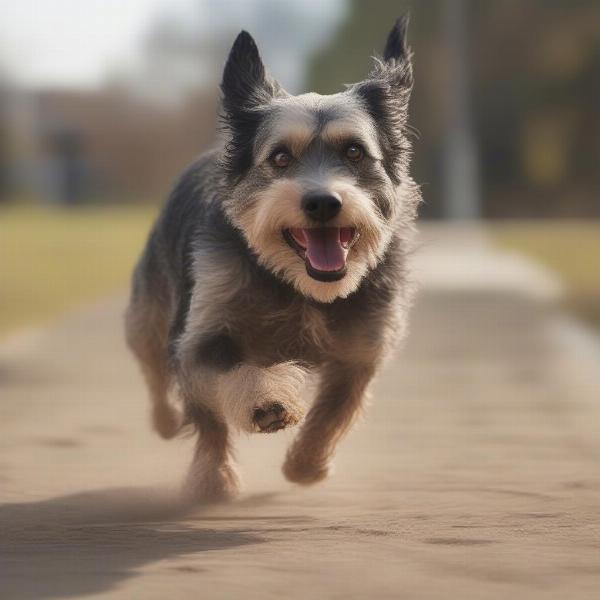Dog running in circles can be a comical sight, but it can also be a sign of underlying issues. Understanding why your dog is exhibiting this behavior is key to addressing any potential problems. This article will delve into the various reasons why dogs run in circles, from simple excitement to more complex medical conditions, and provide helpful advice on when to seek veterinary attention.
Why Is My Dog Running in Circles?
There are numerous reasons why a dog might engage in circular running. Some of these are perfectly normal and harmless, while others may warrant closer examination. Let’s explore the possibilities:
Excitement and Joy
One of the most common reasons for a dog running in circles is sheer excitement. Perhaps you’ve just come home after a long day, or maybe it’s time for their favorite walk. This joyful energy can manifest as spinning, often accompanied by tail wags and happy barks.
Playfulness and Zoomies
The infamous “zoomies” are another common culprit. These bursts of frantic energy often involve running in circles, and are a normal way for dogs to release pent-up energy.
Compulsive Behavior
In some cases, circling can be a sign of a compulsive disorder. This is often characterized by repetitive, seemingly pointless behaviors. If your dog is running in circles excessively, seemingly without a trigger, it’s important to consult a veterinarian.
Medical Concerns
Certain medical conditions can also cause a dog to run in circles. Vestibular disease, for example, affects balance and can lead to disorientation and circling. Neurological issues, inner ear infections, and even certain types of seizures can also trigger this behavior.
Cognitive Dysfunction
In older dogs, cognitive dysfunction, similar to dementia in humans, can manifest as circling, disorientation, and changes in behavior.
Anxiety and Stress
Anxiety and stress can also lead to repetitive behaviors like circling. Identifying and addressing the source of the anxiety is crucial to managing this behavior.
When to Seek Veterinary Attention
While occasional circling is often harmless, it’s essential to be aware of the signs that warrant a veterinary visit. If the circling is frequent, excessive, accompanied by other symptoms like head tilting, loss of balance, or changes in appetite or behavior, consult your veterinarian immediately.
 Dog Running in Circles Due to a Medical Concern
Dog Running in Circles Due to a Medical Concern
Identifying Triggers and Managing the Behavior
If your veterinarian determines that the circling is not caused by a medical condition, identifying any potential triggers can help manage the behavior. Observe your dog closely to see if certain situations, environments, or stimuli precede the circling.
Training and Enrichment
Providing ample exercise and mental stimulation can help reduce anxiety and prevent compulsive behaviors. Engage your dog in regular play, training sessions, and interactive games to keep them physically and mentally stimulated.
Conclusion
Dog running in circles can be caused by a variety of factors, ranging from simple excitement to more complex medical issues. By understanding the potential causes and observing your dog’s behavior, you can determine whether the circling is harmless or a sign of something more serious. Don’t hesitate to contact your veterinarian if you have any concerns about your dog’s health or behavior.
FAQ
-
Why does my dog run in circles before pooping? This is a perfectly normal behavior, thought to be related to aligning their body with the Earth’s magnetic field for optimal elimination.
-
Is it normal for puppies to run in circles? Yes, puppies often run in circles as a way to express excitement, playfulness, and burn off excess energy.
-
How can I tell if my dog’s circling is compulsive? Compulsive circling is often excessive, repetitive, and seemingly without a trigger. Consult a veterinarian if you suspect compulsive behavior.
-
What is vestibular disease in dogs? Vestibular disease affects a dog’s balance and can cause disorientation, circling, head tilting, and other neurological symptoms.
-
Can anxiety cause a dog to run in circles? Yes, anxiety and stress can lead to repetitive behaviors like circling.
-
How can I help my anxious dog stop running in circles? Identifying and addressing the source of the anxiety, along with providing ample exercise and enrichment, can help manage the behavior.
-
What should I do if my dog suddenly starts running in circles and seems disoriented? Contact your veterinarian immediately, as this could be a sign of a medical emergency.
ILM Dog is your trusted source for expert advice on dog care and well-being. We offer a comprehensive range of resources covering breed selection, health and medical care, training, nutrition, grooming, and much more. Whether you’re a first-time dog owner or a seasoned expert, ILM Dog is here to support you every step of the way. For further information or to book a consultation, contact us at [email protected] or call us at +44 20-3965-8624. Visit us online at ILM Dog.